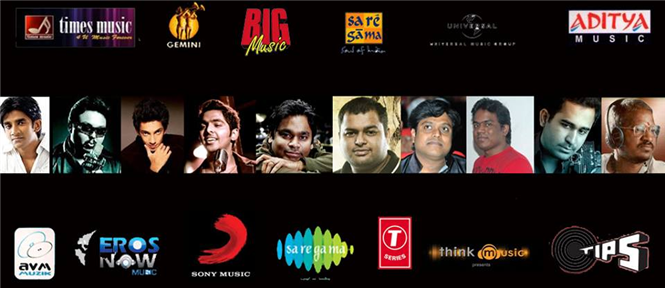Royalty Battle Looms as Musicians and Music Labels lock horns
What has been simmering over the last few months erupted yesterday when a sudden uproar came from music directors and lyricists against music labels who deprive them of their royalty shares. It is customary for the audio labels to buy the music rights from producers to get income (in perpetuity) in the form of digital downloads, audio CD sales, caller tunes, YouTube views, etc.
Recently, the music labels have been tightening their control over the musicians and producers to the point where the creators (music directors and lyricists) are required to sign agreements forcing them to relinquish all their rights of their creative products and without claiming even a small fraction of revenues in the form of royalties.
These stringent contracts by Music labels give them comprehensive rights to sell the tunes and songs globally in all possible languages without informing the musicians nor giving any remunerations or royalties to the producers/music directors/lyricists.
Musicians and Artists starting to feel the pain
The contracts are becoming so restrictive and penalizing to the creators that it has resulted in this uproar among musicians and others involved in the creative process. For example,
- When a song went viral and became a massive hit, the musicians and performing artists did not get a penny from huge revenue collected from caller tunes and downloads.
- When a creator or producer tried to upload a song video from his own movie, the video was quickly brought down due to copyright infringement conditions.
- When a lyricist uploaded his own lyrics with audio clippings of associated songs on his blog page, he was asked to bring down the blog page and audio files.
- When a musician wanted to perform a song that he had composed on stage, the performing group had to seek permission prior to doing so.
Why Musicians and Lyricists are revolting, now?
GV Prakash was the first to rise the voice when he tweeted "Some audio companies are stealing from composers, lyricists and making them sign fake agreements! Not fair!” and “Royalty is the basic right of the creator and it stays with him or her. Trying to steal that from them is cheap!”
Due to the monopoly existing in the Tamil music scene, the pressure to sign these contracts is mounting while the producers are expecting the music directors to sign the contracts filled with so called "unfair" conditions, even at the time of signing a new project. When a music director and lyricist fail to do so, this may even result in losing the opportunity to work in the movie.
What the law says?
In 2012, lyricist Javed Akthar was instrumental in bringing up the amendments to the outdated Copyrights Act. The amendments ensured that there would be lifelong royalty to music directors, lyricists and performers. However, this is not put to practice in a proper manner as there is no proper clarity on the amendments among the music fraternity. Lyricist Madhan Karky claims that they are being forced to sign agreements where their salaries are being broken down into two parts as service charge and ‘advance royalty’.
The alternate view supporting Music Labels
Shankar Krishnamurthy, lawyer cum actor from Bangalore, has made some alternate view points. He has stated “Copyright demanded by people who draw huge remuneration in cinema is something that has to be decided based on the valuation of their work in total considering all kinds of revenues and the legal issues in each segment of revenue that is forecast on some basis. The risks borne by a producer and buyer is more than the creator because for the creator there is no risk but it is their native talent, which they are trading with the producer for money. If there is no taker for that talent, their creation has no value.”
Film Industry joins hands against Music Labels
In the past, such issues have cropped up intermittently. A R Rahman is one of the first musicians who had voiced for the music royalty share. AR Rahman backed out of ‘Om Shanti Om’ when Shahrukh Khan did not agree to share revenue through his home production. Dhanush and a number of big production houses had created their own music labels to overcome these challenges with big music labels. The problem is that after struggling to stay afloat, many of these newly formed music labels closed down due to lack of deep-rooted distribution networks required to monetize the revenue opportunities.
There has always been dissatisfaction among musicians about this issue but it is only now, they have joined hands to provide a unanimous voice. Along with GV Prakash Kumar, Music director Vijay Antony, lyricists Madhan Karky, Na. Muthukumar, Kabilan and Thamarai, director Venkat Prabhu, leading PROs have also voiced their opinions against such "unfair" practices. In the coming days, the film industry is expected to intensify its widespread protest over this topic of royalties and contracts, unless music labels relax their conditions.
